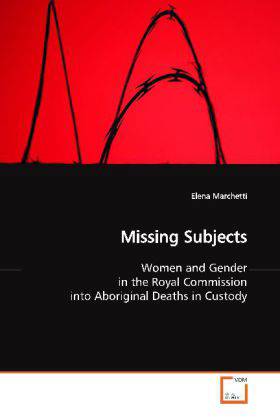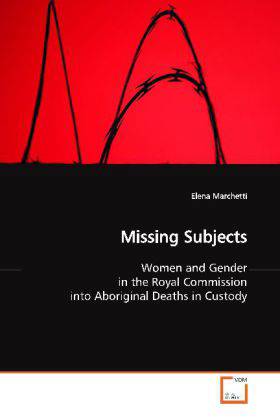
- Afhalen na 1 uur in een winkel met voorraad
- Gratis thuislevering in België vanaf € 30
- Ruim aanbod met 7 miljoen producten
- Afhalen na 1 uur in een winkel met voorraad
- Gratis thuislevering in België vanaf € 30
- Ruim aanbod met 7 miljoen producten
Zoeken
Missing Subjects
Women and Gender in the Royal Commission into Aboriginal Deaths in Custody
Elena Marchetti
Paperback | Engels
€ 103,45
+ 206 punten
Omschrijving
Although the Australian Royal Commission into
Aboriginal Deaths in Custody (RCIADIC) tabled its
National Report over a decade ago, its 339
recommendations are still used today to steer
Indigenous justice policy. The inquiry began as an
investigation into Indigenous deaths in custody, but
its scope was later broadened to encompass a wide
range of matters affecting Indigenous Australians.
Numerous criticisms have been made about the way the
investigation was conducted and about the
effectiveness and appropriateness of the
recommendations made. In particular, a number of
criticisms highlighted the failure of the RCIADIC to
consider the problems confronting Indigenous women.
This book contains a detailed analysis of the way in
which the problems confronting Indigenous women were
considered in the Indigenous texts and official
reports produced by the RCIADIC, and using data from
48 interviews of people who either worked for the
RCIADIC or were in some other way associated with
the RCIADIC, it provides reasons for the male-
centred focus of the inquiry.
Aboriginal Deaths in Custody (RCIADIC) tabled its
National Report over a decade ago, its 339
recommendations are still used today to steer
Indigenous justice policy. The inquiry began as an
investigation into Indigenous deaths in custody, but
its scope was later broadened to encompass a wide
range of matters affecting Indigenous Australians.
Numerous criticisms have been made about the way the
investigation was conducted and about the
effectiveness and appropriateness of the
recommendations made. In particular, a number of
criticisms highlighted the failure of the RCIADIC to
consider the problems confronting Indigenous women.
This book contains a detailed analysis of the way in
which the problems confronting Indigenous women were
considered in the Indigenous texts and official
reports produced by the RCIADIC, and using data from
48 interviews of people who either worked for the
RCIADIC or were in some other way associated with
the RCIADIC, it provides reasons for the male-
centred focus of the inquiry.
Specificaties
Betrokkenen
- Auteur(s):
- Uitgeverij:
Inhoud
- Aantal bladzijden:
- 324
- Taal:
- Engels
Eigenschappen
- Productcode (EAN):
- 9783639016925
- Verschijningsdatum:
- 19/03/2009
- Uitvoering:
- Paperback
- Afmetingen:
- 150 mm x 220 mm
- Gewicht:
- 446 g

Alleen bij Standaard Boekhandel
+ 206 punten op je klantenkaart van Standaard Boekhandel
Beoordelingen
We publiceren alleen reviews die voldoen aan de voorwaarden voor reviews. Bekijk onze voorwaarden voor reviews.







